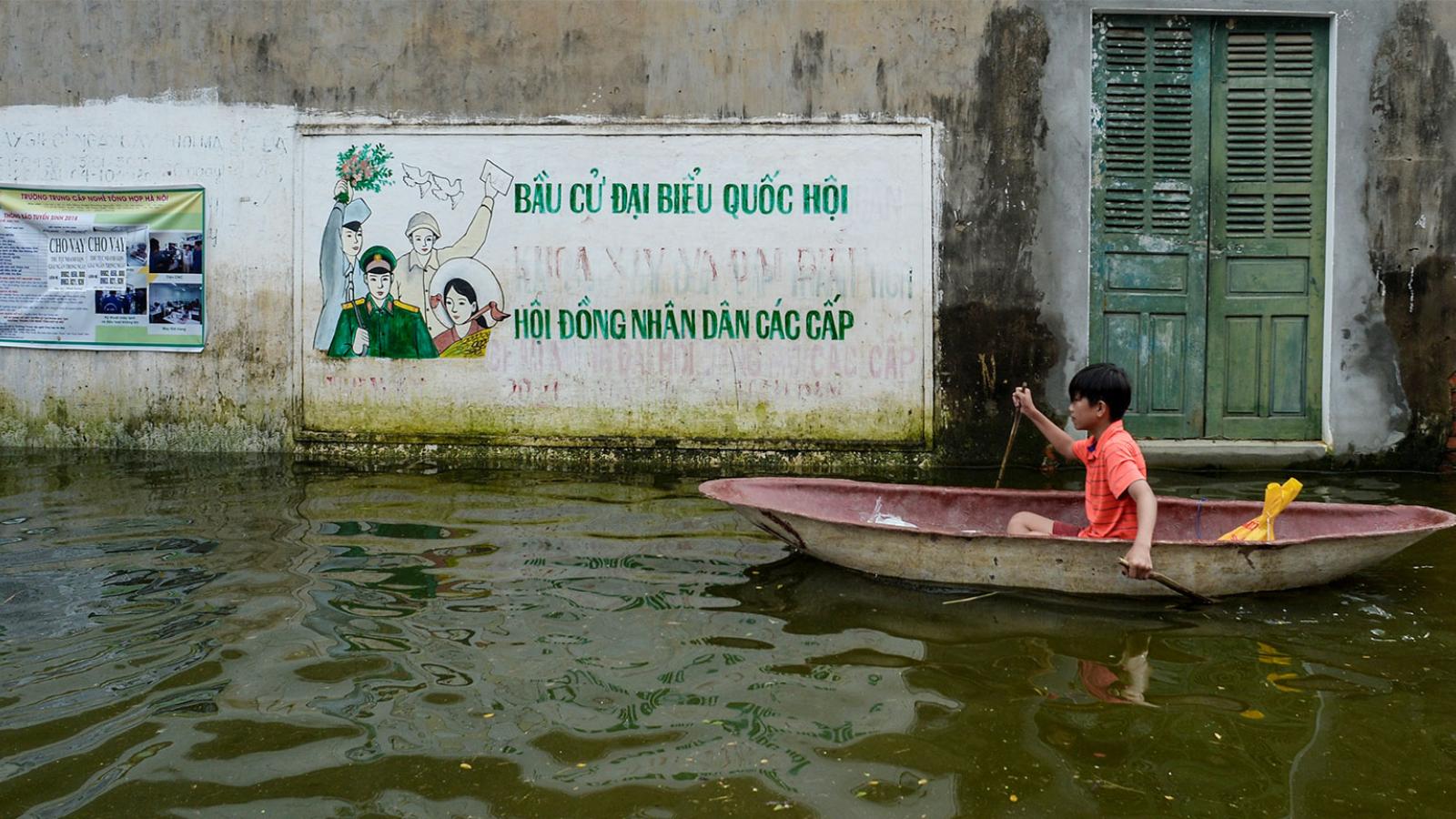How do climate shocks impact children’s development: evidence from Vietnam
Vietnam is highly vulnerable to the impacts of climate change and the effects are being felt by everyone, but children are at particular risk. Vu Thi Thu Thu of Young Lives Vietnam sets out what their data can tell us.

The increasing number of extreme weather events such as storms, droughts, and floods caused by global climate change make Vietnam one of the most affected countries in the world. The country is experiencing frequent extreme weather, having recorded its highest ever temperature of 44.1C last month (May 2023), with rising sea levels a growing concern. Climate change has both immediate and longer-term effects on Vietnamese people of all ages, including children. Recent estimates by UNICEF suggest that over 1.5 million children are at risk of the effects of widespread flooding and landslides in central Vietnam.
The Young Lives study has followed the lives of 12,000 children in Vietnam, Ethiopia, India (Andhra Pradesh and Telangana), and Peru for more than 20 years, and has generated a unique dataset showing that climate change affects many aspects of children’s development. This blog shares some of this evidence, highlighting new research we are currently undertaking in Vietnam to further understand the impact of climate shocks not only on children’s physical health and education, but also on their mental health and well-being. Improving our understanding of how children actually experience and are affected by climate-related shocks will help to generate evidence-based policies to help build resilience and protect children from these impacts.
Climate change is affecting everyone in Vietnam, but with significant differences according to age groups. Children and young people are at particular risk from climate change because they are still growing and typically depend on others. Young Lives findings have shown that childhood exposure to climate shocks, such as flooding and related crop failures significantly affects children's nutrition, growth, cognitive skills, and access to education. This impedes their learning – including foundational learning through developing basic literacy, numeracy and socio-emotional skills – with the poorest children most affected.
Impact on children’s physical health
Experiencing climate shocks can also have a detrimental impact on children's health. When extreme weather events occur, they can immediately lead to physical injuries or increase childhood diseases, such as diarrhea, dengue fever, and malaria. Storms, droughts, and floods can also damage food crops, affecting household incomes and often leading to higher food prices, which in turn impacts household’s food security and children’s nutritional intake. Evidence from Young Lives shows that poor diets and malnutrition can have severe long-term consequences on children's physical growth, with children and adolescents significantly affected by poorer diets. Across all four of our study countries, the children most likely to be undernourished are in the poorest households, in rural areas, and often among minority ethnic groups.
Impact on children’s learning
Climate change is also having both direct and indirect impacts on children’s learning outcomes. Directly, extreme weather events such as typhoons or floods can destroy school facilities causing schools to close and children to miss school. A series of floods in October 2020, including three strong storms - Linfa, Nangka, and Molave - severely damaged many schools in the whole Central region of Vietnam, and schools had to close for several weeks.
Indirectly, extreme weather events can contribute to an increase in school dropout and reduce the quality of education. A study using Young Lives Vietnam data showed that severe rainfall shocks during pregnancy adversely impacted children’s school entry to and progress through school.
Young Lives data in Vietnam, show that children in households that are affected by flooding do significantly less well in mathematics and vocabulary tests, are less likely to complete grades, and less likely to be enrolled in school. Our data also show that rainfall shocks experienced by girls between ages 12–13 have a significant negative effect on their adult height. This could partly be explained by an increase in the prevalence of infectious diseases during flooding, which may reduce the absorption of nutrients during the pubertal growth spurt in low-income settings.
Deteriorating mental health
In addition to affecting children’s health and education, climate shocks are increasingly being seen as a threat to their mental health and well-being. Using a developmental life-course perspective, Vergunst and Berry, have shown that climate shocks can increase the risk of mental health issues from conception onwards. As well as impacting a household’s financial status, climate change can affect family members’ health, and their access to decent work, sometimes triggering the need to migrate. Taken together, these effects can indirectly impact children’s mental health.
Research using Young Lives data shows that rainfall shocks impacts parents’ mental health which increases the risk of children being underweight. Further analysis of Young Lives’ data suggests a link between rainfall shocks and children's mental health, because of the impact on household income. This study found that rainfall shocks can lead to a decrease in household income with children from these households more likely to work in order to compensate. The author found a negative impact of child labor on mental health using Young Lives data from Vietnam and India.
Young Lives’ evidence during the pandemic shows that food insecurity can have a significant impact on young people’s mental health. In Vietnam, young people in households that ran out of food at least once during the pandemic were four times more likely to experience symptoms of anxiety and depression than those who did not, with those from minority ethnic groups most affected. In Ethiopia, when the severe drought happened in 2021, a huge number of households – 40 percent - ran out of food, and young people experienced a ten-fold increase in symptoms of anxiety and depression, compared to 2020.
With increasing extreme weather events continuing to impact the poorest families the most, we need to better understand how vulnerable children actually experience and respond to climate-related shocks. Young Lives is taking forward new analysis to further investigate the impact of climate shocks on both children’s educational achievement and their mental health, with new research findings due to be published later this year.
Vietnam made a strong commitment at the United Nations Climate Change Conference in 2021 (COP26) to achieve net-zero carbon emissions by 2050, and recently released a National Strategy on Climate Change. Urgent action and a broad approach is now needed to make the government’s ambition a reality, and mitigate the impact of climate change on children across all aspects of their development.

